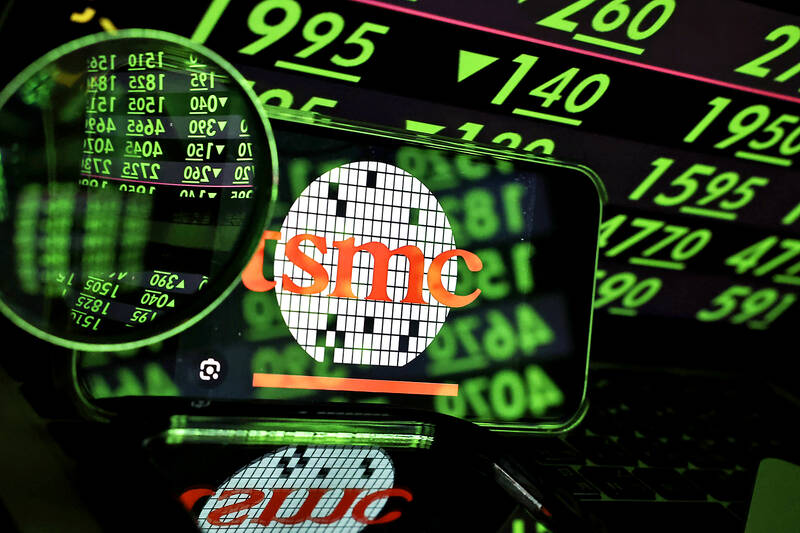The TAIEX yesterday recorded its third-steepest fall in history, falling almost 1,000 points in a sell-off triggered by a tumble on Wall Street overnight amid growing concerns over the possible hard landing of the US economy, dealers said.
Technology stocks led the downturn on the main board as investors took their cues from a plunge in the shares of US-based artificial intelligence (AI) chip designer Nvidia Corp, which is facing an antitrust investigation by the US Department of Justice, dealers added.
The TAIEX closed down 999.46 points, or 4.52 percent, at 21,092.75, with the loss the third-sharpest fall after a drop of 1,807.21 points on Aug. 5 and a decline of 1,004.01 recorded on Aug. 2.

Photo: CNA
The heavy losses pushed the market capitalization of the main board down by NT$3.17 trillion (US$98.48 billion) to NT$67.36 trillion, the first time in nearly a month that market value fell below the NT$70 trillion mark.
Elsewhere in Asia, Japan’s benchmark Nikkei 225 index lost 4.2 percent and South Korea’s KOSPI was down 3.2 percent.
Australia’s S&P/ASX 200 was down 1.9 percent, Hong Kong’s Hang Seng index declined 1.1 percent and the Shanghai Composite index shed 0.7 percent.
The focus was on the monthly Institute for Supply Management (ISM) manufacturing survey data published on Tuesday, showing that the contraction in US manufacturing activity continued into a fifth consecutive month last month as demand remained weak.
The ISM manufacturing index was 47.2 percent, up 0.4 percentage points from a month earlier, but still well below the 50-point mark separating expansion from contraction.
The figure was slightly below market expectations of 47.9, according to Briefing.com.
“The latest manufacturing activity raised fears over a possible hard landing for the US economy, sending ripples through US stock markets overnight,” Mega International Investment Services Corp (兆豐國際投顧) analyst Alex Huang (黃國偉) said.
“More importantly, Nvidia shares reported a steep fall [of 9.53 percent] overnight as the US Department of Justice sent a subpoena to Nvidia to seek evidence that the chipmaker violated antitrust laws, which turned many investors away from tech stocks on US markets and on regional markets,” Huang said.
Coming under great pressure, contract chipmaker Taiwan Semiconductor Manufacturing Co (TSMC, 台積電) lost 5.43 percent to close at NT$889, its lowest closing level since Aug. 6. The stock contributed about 413 points to the TAIEX’s fall yesterday.
In the wake of Nvidia’s slump, AI-related stocks also moved sharply lower, with AI server maker Quanta Computer Inc (廣達) falling 8.09 percent and rival Wistron Corp (緯創) shedding 5.15 percent.
Foreign investors sold a net NT$100.75 billion of Taiwanese shares yesterday, a record daily outflow according to Bloomberg-compiled data that started in 2000.
“Taiwan’s and TSMC’s share performance have become increasingly correlated with Nividia’s over the past year, and recent market volatility is reflecting concerns on the AI demand outlook,” Bloomberg Intelligence strategist Marvin Chen said. “While the earnings growth for the chip sector still looks strong, valuations may be a near-term concern.”

WEAKER ACTIVITY: The sharpest deterioration was seen in the electronics and optical components sector, with the production index falling 13.2 points to 44.5 Taiwan’s manufacturing sector last month contracted for a second consecutive month, with the purchasing managers’ index (PMI) slipping to 48, reflecting ongoing caution over trade uncertainties, the Chung-Hua Institution for Economic Research (CIER, 中華經濟研究院) said yesterday. The decline reflects growing caution among companies amid uncertainty surrounding US tariffs, semiconductor duties and automotive import levies, and it is also likely linked to fading front-loading activity, CIER president Lien Hsien-ming (連賢明) said. “Some clients have started shifting orders to Southeast Asian countries where tariff regimes are already clear,” Lien told a news conference. Firms across the supply chain are also lowering stock levels to mitigate

IN THE AIR: While most companies said they were committed to North American operations, some added that production and costs would depend on the outcome of a US trade probe Leading local contract electronics makers Wistron Corp (緯創), Quanta Computer Inc (廣達), Inventec Corp (英業達) and Compal Electronics Inc (仁寶) are to maintain their North American expansion plans, despite Washington’s 20 percent tariff on Taiwanese goods. Wistron said it has long maintained a presence in the US, while distributing production across Taiwan, North America, Southeast Asia and Europe. The company is in talks with customers to align capacity with their site preferences, a company official told the Taipei Times by telephone on Friday. The company is still in talks with clients over who would bear the tariff costs, with the outcome pending further

Six Taiwanese companies, including contract chipmaker Taiwan Semiconductor Manufacturing Co (TSMC, 台積電), made the 2025 Fortune Global 500 list of the world’s largest firms by revenue. In a report published by New York-based Fortune magazine on Tuesday, Hon Hai Precision Industry Co (鴻海精密), also known as Foxconn Technology Group (富士康科技集團), ranked highest among Taiwanese firms, placing 28th with revenue of US$213.69 billion. Up 60 spots from last year, TSMC rose to No. 126 with US$90.16 billion in revenue, followed by Quanta Computer Inc (廣達) at 348th, Pegatron Corp (和碩) at 461st, CPC Corp, Taiwan (台灣中油) at 494th and Wistron Corp (緯創) at

NEGOTIATIONS: Semiconductors play an outsized role in Taiwan’s industrial and economic development and are a major driver of the Taiwan-US trade imbalance With US President Donald Trump threatening to impose tariffs on semiconductors, Taiwan is expected to face a significant challenge, as information and communications technology (ICT) products account for more than 70 percent of its exports to the US, Chung-Hua Institution for Economic Research (CIER, 中華經濟研究院) president Lien Hsien-ming (連賢明) said on Friday. Compared with other countries, semiconductors play a disproportionately large role in Taiwan’s industrial and economic development, Lien said. As the sixth-largest contributor to the US trade deficit, Taiwan recorded a US$73.9 billion trade surplus with the US last year — up from US$47.8 billion in 2023 — driven by strong